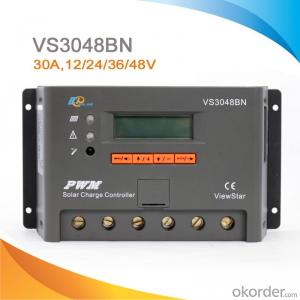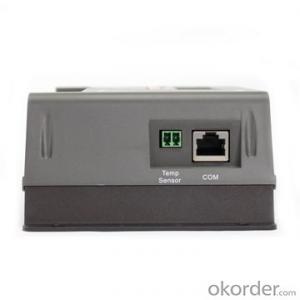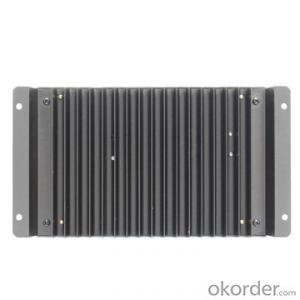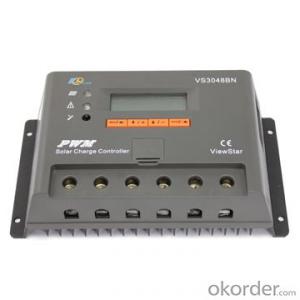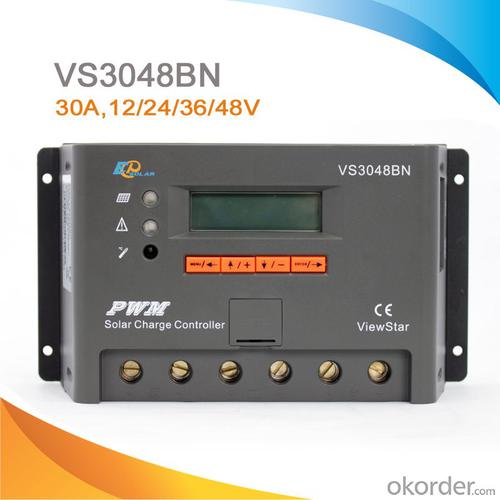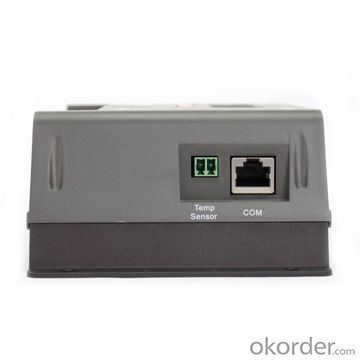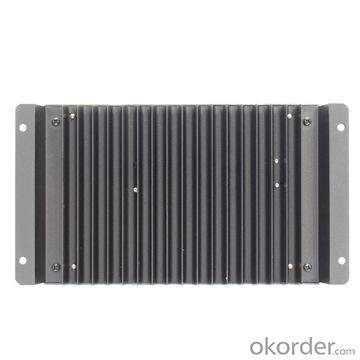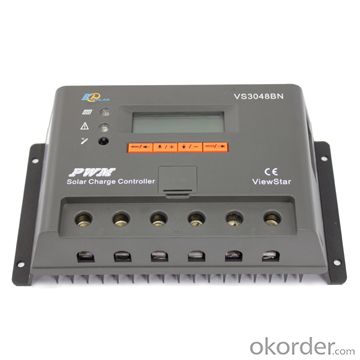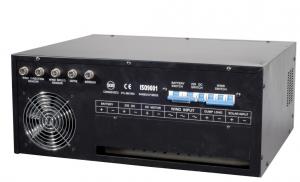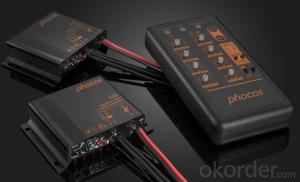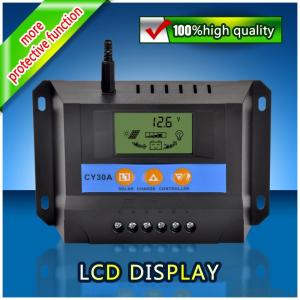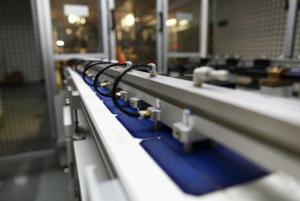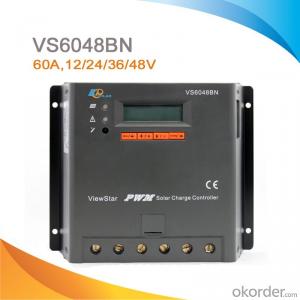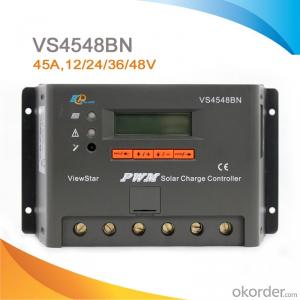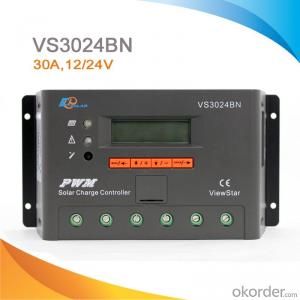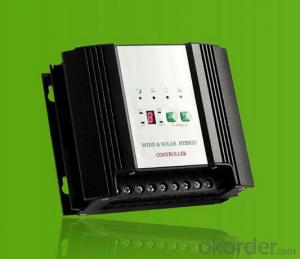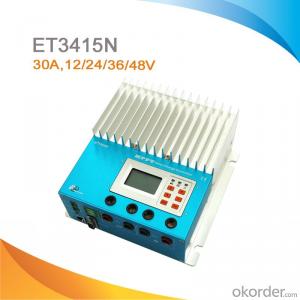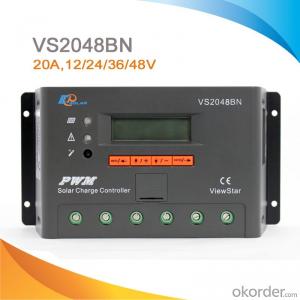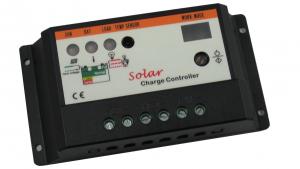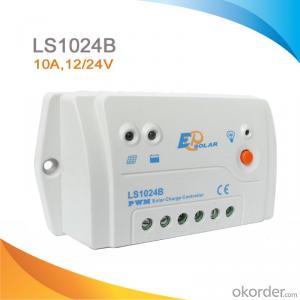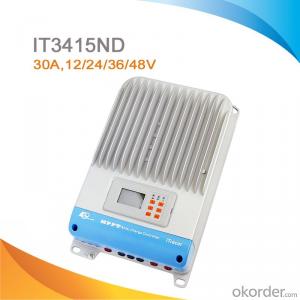LCD Display PWM MPPT Solar System Charge Controller/Regulator 30A 12/24/36/48V, VS3048BN
- Loading Port:
- Tianjin
- Payment Terms:
- TT or LC
- Min Order Qty:
- -
- Supply Capability:
- 10000 pc/month
OKorder Service Pledge
OKorder Financial Service
You Might Also Like
ViewStar series solar controller is our new generation controller for off-grid solar system, such as street light, solar home system or small power station etc.
Features:
·Excellent EMC design
·32 bit MCU with high speed
·High efficient Series PWM charging
·Four battery type options: Sealed, Gel, Flooded, and USER
·Intelligent lighting and timer control for solar lighting system
·12 bit A/D high-precision sampling to ensure accuracy
·Use MOSFET as electronic switch
·Full control parameters setting and modification, diversified load control mode
·Humanized design of browser interface, undertake every operating conveniently
·Temperature compensation
·Adopt graphics dot-matrix LCD screen and HMI (human-machine interface) with 4 buttons,integrated menu displaying and operation
·Energy statistics function
·RS485 ports with MODBUS communication protocol
·Optional PC monitoring software and remote meter for real-time monitoring and battery management parameter setting
·Field upgradable firmware
Electronic Protections:
·PV short circuit protection
·PV reverse polarity protection
·Battery overcharge protection
·Battery over discharge protection
·Battery reverse polarity protection
·Load overload protection
·Load short circuit protection
·Overheating protection
Specification:
Nominal system voltage | 12/24/36/48V auto work | |||
Rated battery current | 20A | 30A | 45A | 60A |
Rated load current | 20A | 30A | 45A | 60A |
Max. battery voltage | 64V | |||
Equalize charging voltage | Sealed: 14.6V, Flooded: 14.8V, User-defined: 9~17V | |||
Boost charging voltage | Gel: 14.2V, Sealed: 14.6V, Flooded: 14.8V, User-defined: 9~17V | |||
Float charging voltage | Gel /Sealed /Flooded: 13.8V, User-defined: 9~17V | |||
Low voltage reconnect voltage | Gel /Sealed /Flooded: 12.6V, User-defined: 9~17V | |||
Low voltage disconnect voltage | Gel /Sealed /Flooded: 11.1V, User-defined: 9~17V | |||
Self-consumption | ≤15mA(12V); ≤10mA(24V); ≤9mA(36V); ≤8mA(48V) | |||
Grounding | Common negative | |||
Temp. compensation | -3mV/°C/2V | |||
Relative humidity | 10%~90% Non-condensation | |||
Communication | RS485 / RJ45 interface | |||
LCD temperature | -20°C ~ +70°C | |||
Working temperature | -25°C ~ +55°C | |||
Humidity | ≤95% N.C. | |||
Enclosure | IP30 | |||
Overall dimension | 200x103x58mm | 201x109x59mm | 205x119x67mm | 205x174x64mm |
Terminals | 16mm2 | 35mm2 | 35mm2 | 35mm2 |
Net weight | 0.7kg | 0.9kg | 1.2kg | 1.5kg |
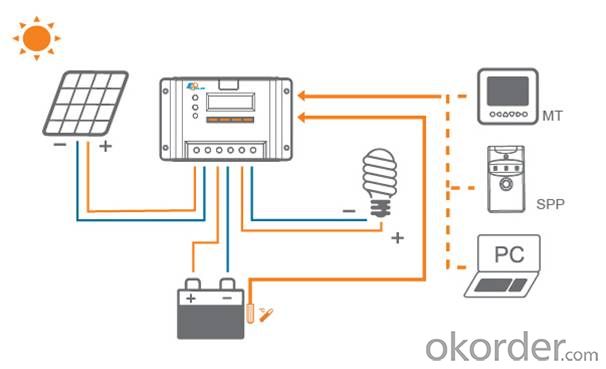
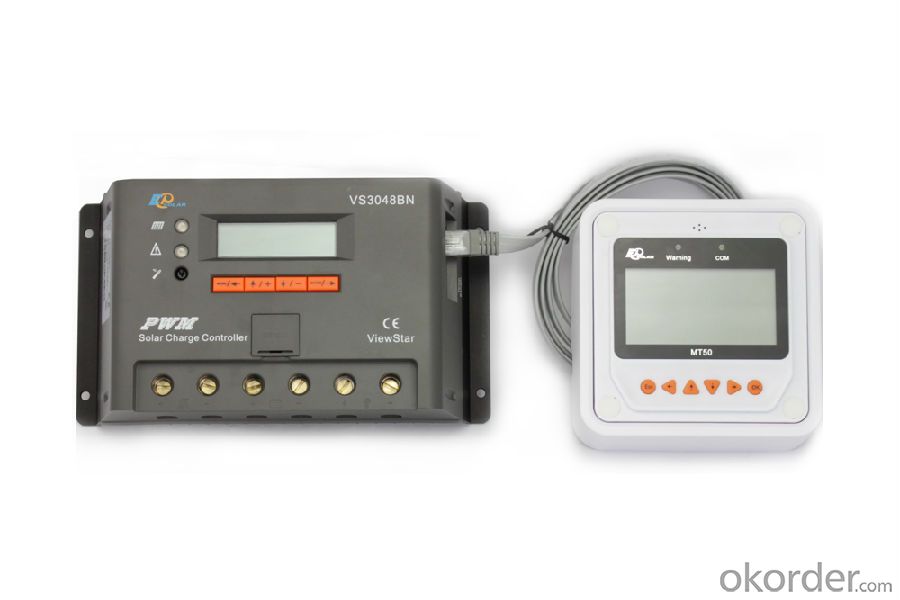
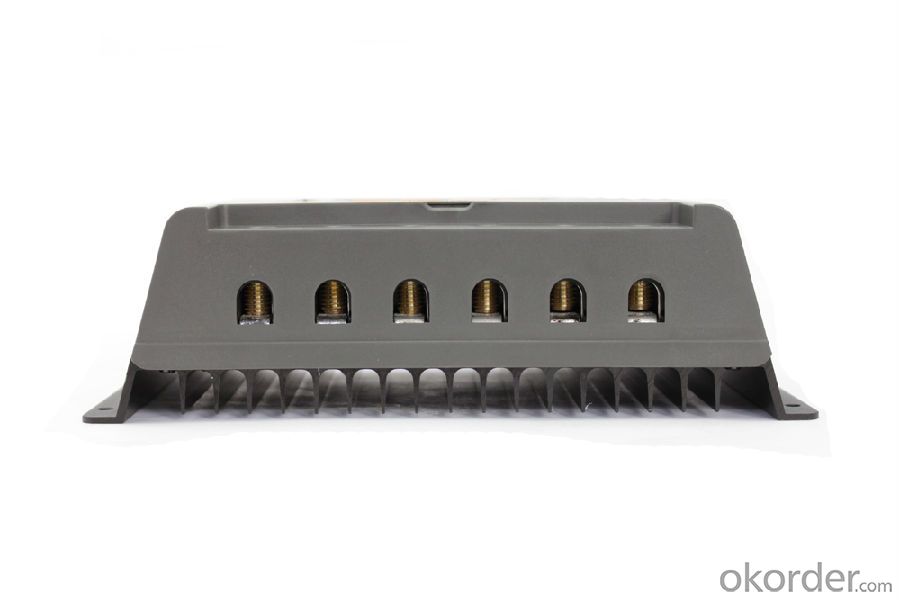
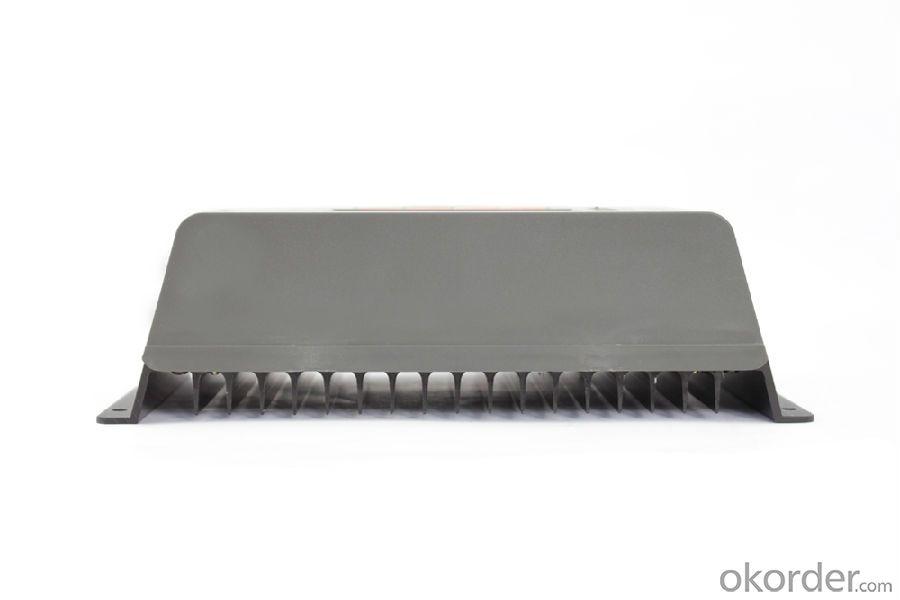
FAQ:
Q1. What is the voltage?
A1. Our 45/60A solar charge controller is 12/24/36/48V auto work.
Q2. What is the difference between MPPT&PWM?
A2. MPPT has higher efficiency, it can track the max power point and won't waste energy.
Q3. What is the efficiency of the MPPT controller?
A3. MPPT>99%, peak conversion efficiency>98%.
Q4. What is the waranty of product?
A4. 12 months.
- Q: What is the role of a battery equalization function in a solar controller?
- The role of a battery equalization function in a solar controller is to balance the charge levels of individual battery cells or groups of cells within a battery bank. This function ensures that each cell or group is charged and discharged evenly, preventing any imbalances that can lead to reduced battery performance or premature failure. By equalizing the charge levels, the battery's overall capacity and lifespan are optimized, resulting in more efficient and reliable energy storage for the solar system.
- Q: How does a solar controller handle battery temperature compensation?
- A solar controller handles battery temperature compensation by continuously monitoring the temperature of the battery. It adjusts the charging voltage and current according to the battery's temperature to optimize charging efficiency and protect the battery from overcharging or undercharging.
- Q: Can a solar controller be used with a solar-powered irrigation pump?
- Yes, a solar controller can be used with a solar-powered irrigation pump. The solar controller helps regulate and optimize the energy from the solar panels, ensuring proper power management and efficient operation of the pump.
- Q: Are there any disadvantages of using a solar controller?
- Yes, there are some disadvantages of using a solar controller. One major disadvantage is that solar controllers can be quite expensive to purchase and install. The cost of a solar controller can add to the overall cost of setting up a solar power system, which may be a deterrent for some individuals or businesses. Another disadvantage is that solar controllers can be quite complex to operate and maintain. They require proper programming and configuration to ensure optimal performance, and regular maintenance to keep them functioning efficiently. This may require technical expertise or the hiring of professionals, which can be an additional cost. In addition, solar controllers can have limited compatibility with certain solar panels or battery systems. It is important to ensure that the solar controller is compatible with the specific components of the solar power system, otherwise it may not function properly or could even cause damage. Lastly, solar controllers rely on sunlight to generate power, so they may not be as effective in areas with limited sunlight or during cloudy days. This can result in reduced energy production and may require alternative power sources or energy storage solutions. Overall, while solar controllers offer many benefits in terms of regulating and optimizing solar power systems, they do come with some disadvantages that need to be considered before making a decision.
- Q: Can a solar controller be used with a solar-powered religious institution?
- Yes, a solar controller can be used with a solar-powered religious institution. A solar controller helps regulate and manage the flow of electricity from solar panels to the battery storage system, ensuring optimal charging and preventing overcharging. This is essential for maintaining a reliable and efficient power supply in any solar-powered facility, including religious institutions.
- Q: Can a solar controller handle different load types (e.g., resistive, inductive)?
- No, a solar controller is not designed to handle different load types. It is primarily responsible for regulating the charging and discharging of batteries in a solar power system. The load types, such as resistive or inductive, should be handled by appropriate devices like inverters or converters that are specifically designed for those load types.
- Q: Can a solar controller be used with a solar-powered retail store?
- Yes, a solar controller can be used with a solar-powered retail store. A solar controller is essential in regulating and controlling the flow of electricity from the solar panels to the battery or grid. It helps ensure the proper charging and maintenance of the battery, as well as prevents overcharging or damage to the system. Therefore, using a solar controller is crucial in managing the energy supply for a solar-powered retail store.
- Q: How do I connect a solar controller to a battery bank?
- To establish a connection between a solar controller and a battery bank, adhere to the subsequent guidelines: 1. Commence by situating the solar controller in close proximity to the battery bank, preferably within easy access to both the solar panels and the batteries. 2. Ascertain the positive and negative terminals on both the solar controller and the battery bank. Typically, the positive terminal is indicated by a "+" symbol or a red color, while the negative terminal is marked with a "-" symbol or a black color. 3. Employ a suitably sized cable or wire to link the positive terminal of the solar controller to the positive terminal of the battery bank. Guarantee that the connection is secure and firmly fastened. 4. Employ another appropriately sized cable or wire to connect the negative terminal of the solar controller to the negative terminal of the battery bank. Once again, ensure the connection is secure. 5. Thoroughly inspect all connections to verify the absence of loose or exposed wires that could potentially lead to a short circuit or other safety hazards. 6. Subsequent to confirming the security of all connections, activate the solar controller and adhere to the manufacturer's instructions to configure the settings, such as battery type and charging parameters, if necessary. 7. Regularly monitor the solar controller to ensure proper functionality and efficient charging of the battery bank. Adjust the settings as required to optimize the charging process. Always consult the manufacturer's instructions for your specific solar controller and battery bank to guarantee proper installation and operation. If uncertain about any step of the process, it is advisable to seek guidance from a professional or an experienced individual.
- Q: How does a solar controller handle shading on solar panels?
- A solar controller handles shading on solar panels by using Maximum Power Point Tracking (MPPT) technology. This technology allows the controller to constantly monitor the voltage and current output of the solar panels, adjusting the load to ensure that the panels operate at their maximum power output despite shading. By dynamically optimizing the voltage and current, the solar controller minimizes the impact of shading and maximizes the overall energy generation of the solar panels.
- Q: Can a solar controller be used with a solar-powered satellite dish?
- Yes, a solar controller can be used with a solar-powered satellite dish. A solar controller is essential for regulating the power output from the solar panels and ensuring that the satellite dish receives a consistent and stable power supply. It helps protect the batteries from overcharging and optimizes the energy conversion process. Thus, a solar controller is a crucial component in the functioning of a solar-powered satellite dish.
Send your message to us
LCD Display PWM MPPT Solar System Charge Controller/Regulator 30A 12/24/36/48V, VS3048BN
- Loading Port:
- Tianjin
- Payment Terms:
- TT or LC
- Min Order Qty:
- -
- Supply Capability:
- 10000 pc/month
OKorder Service Pledge
OKorder Financial Service
Similar products
Hot products
Hot Searches
Related keywords
